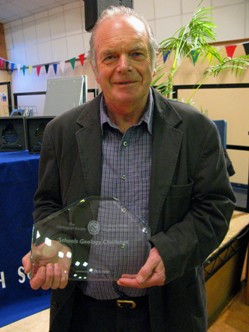
Ted Nield visits Cardiff to watch geology students from six Welsh schools face some tough questioning at the South Wales Regional Group’s first Schools Geology Challenge.
Geoscientist 20.05 May 2010
My heart went out to the thirty or so young competitors (from years 12 and 13, in six teams), as they faced a question to which the answer was “O T Jones”; but this was, I reminded myself, the Land of my Fathers, where nothing lives quite as vividly as a dead hero.
Wales remains rightly proud of its heroes and heritage and all those rather tiresome little trains; but today there is a sense of futurity and (in the capital at least) prosperity, that I don’t remember from my years as a student in the 1970s and 80s - when the only upwardly mobile thing in Cardiff was a late-night kebab from El Greco’s. The Society’s vibrant South Wales Regional Group is a case in point. They obtained extensive sponsorship to mount an ambitious quiz evening, which drew pupils from schools as far afield as Monmouth and Llanelli to Whitchurch High. There each team presented their ideas on “What can geologists do to save the planet”, and were put through their paces in a series of written and oral tests.
As the teams’ opening presentations unfolded it became clear that they had been tipped off that President Designate Dr Bryan Lovell was not only among the judges but was going to be speaking after the first round. A pattern swiftly emerged. Whether teams presented jointly or singly, used PowerPoint, or included a Planetary Rap from a dude in dreads, not one failed to conclude that the main way in which geoscientists could contribute to the future of our planet was through Carbon Capture and Storage (CCS). This was handy, because that was exactly the subject on which Bryan later expanded - after first grilling the teams about what, in their presentations, they were “sure enough to tell a judge under oath”, and what they felt less confident about.
This exercise proved highly revealing. The ideas that instilled most confidence were - that CCS was going to be big; that whatever humans do to it, “the planet” would be fine; and that while earthquake forecasting would become more accurate, it would only be about where, and sadly not about when. Teams were less confident that CCS would be allowed to fulfil its potential. Some were less than totally confident that the anthropogenic element in climate change was as large as global warmers would have us believe; though they also felt that this hardly mattered from a policy point of view, because it would be folly to exacerbate a natural trend. Finally, one team noted that CCS should not be considered a long-term solution. It was a stop-gap measure, buying crucial time to develop the clean technologies that would ensure a sustainable future. And so, as well as showing that they had swotted their science, all teams displayed a remarkable ability to make reasoned assessments of risk and practicality that would put many a politician – indeed, many an adult – squarely to shame.